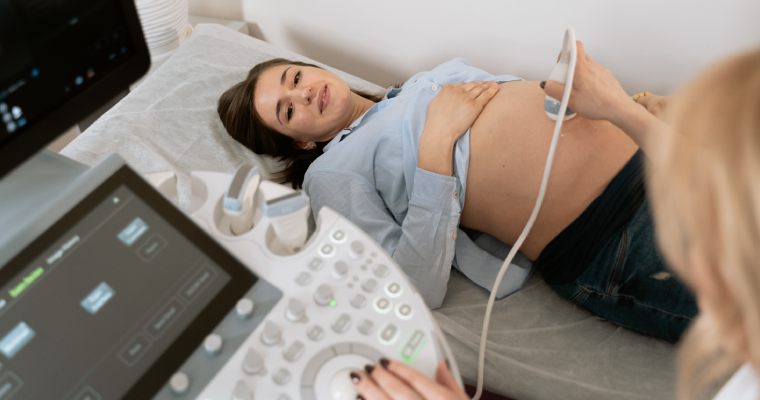8 Weeks Pregnant
- BABY NAMES
-
- UPDATED JULY 14, 2022

by Tasha Mayberry
430 shares
The eighth week of pregnancy is an exciting time. There’s so much happening in your body, and there’s so much happening for your baby. There are some things you may need to do, and some things you may need to start thinking about when you’re 8 weeks pregnant.

Your Baby
Your baby is now roughly the same size as a raspberry. The organs, limbs, facial features, bones and muscles have all begun to develop. The upper body and head develop faster than the lower body, so your baby’s head will begin to uncurl. You baby is also doing a lot of moving during this stage though you won’t feel it.
Your baby has also begun to develop boy or girl parts. It’s far too early for a doctor to be able to tell what you’re having, but the development has begun.
Your baby is still getting nutrition from the yolk of the egg sac, but the placenta is developing, and getting ready to take over providing all nutritional needs. At this stage, your baby is no longer medically considered an embryo, and is now a fetus.
Your Body

As your baby grows, your body will also be changing. Your uterus has now expanded to the size of a grapefruit. It’s not going to be noticeable to anyone but you. You may notice that your jeans feel tighter, and that the top button doesn’t want to do up as easily as it did before.
You may also be experiencing morning sickness. Unfortunately morning sickness isn’t limited to the morning, and you might feel queasy all day long. Eating little and often can help, and eating things like crackers might help.
Pregnancy Symptoms At 8 Weeks Pregnant
As well as morning sickness, there may be some other pregnancy symptoms that you start to notice when you reach 8 weeks pregnant.

Fatigue
At this stage you may notice that you have even less energy than usual. You may feel very tired by the afternoon. You should try to have a nap, but make sure that there is plenty of time between your nap time, and your usual bedtime.
Bloating, Gas And Constipation
You might begin to feel bloated, gaseous, and constipated during this stage of pregnancy. There are a few things you can try to relieve these symptoms. First, make sure you’re drinking plenty of water. Constipation can become worse if you are dehydrated.
You should also try to eat little and often. Your pregnancy hormones can cause your digestion to slow which can lead to bloating, gas, and heartburn. Eating small meals regularly can help ease the symptoms.
Headaches
Some women notice that they begin to get headaches at around 8 weeks pregnant. If you do begin to experience headaches, you will need to talk to your doctor to find an appropriate medication to help ease them. Many over the counter medications are not suitable for use during pregnancy.
Melasma
Melasma is the name for darkening of spots, freckles, and other areas of the skin that occurs during pregnancy. It can also cause a dark line down the centre of your abdomen. It’s not usually anything to worry about, and it oftens goes away again after you’ve given birth. However, it’s a good idea to increase the SPF skincare you use. You may notice that your freckles, and any spots get darker if you’re outside in the sun, so make sure that you wear a minimum of SPF30, but SPF50 would be better.
Food Cravings Or Aversions
You might begin to notice that you have cravings for certain foods, or that other foods now turn your stomach. It’s completely normal. Generally speaking, if your body is craving a particular food, it’s because there’s some nutrient in it that your body needs. Unless you’re craving a non-food item, feed your cravings. If you are craving something that isn’t a food, you should talk to your doctor as this can indicate a lack of iron.
The same rule of thumb applies for food aversions. If you don’t want to eat a certain food, then don’t. You may be able to find another food item with a similar nutritional content that your stomach would tolerate instead. For example, if vegetables are making you feel queasy, try fruits instead. Another thing to keep in mind for fruit is that the brightness of the colour inside indicates how good it is for you. The brighter the inside, the better the fruit.
Things To Do At 8 Weeks Pregnant
There may be a few things you need to do when you reach the eight week stage of pregnancy.

First Appointment
If you haven’t already had a first appointment with your midwife or healthcare provider, you should make one now. You’ll probably have blood tests, and a urine test to confirm your pregnancy, and check your hormone levels. You’ll also be asked questions on your medical history, and your family medical history. The first appointment can be long and most healthcare providers advise that it can take around an hour.
During this appointment you should ask any questions you may have about pregnancy screening tests, and your options for how and where you want to give birth. You’ll also need to get your midwife to sign a form that allows you to apply for free prescriptions throughout your pregnancy.
It can be a good idea to write a list of questions you have, and bring it with you. Your midwife or healthcare provider will be able to answer them for you.
Telling Other People
Some people prefer to wait to tell others about their pregnancy until they’re 12 weeks pregnant. You may prefer to tell others sooner. The choice is entirely up to you, but there are some people you may need to tell.
You may need to consider letting your employer know. You may need to be assigned a different role during your pregnancy, be given restricted duties, your employer may need to make some alterations to your workspace, or if they can’t do any of that, they may need to suspend you on full pay. Some workplaces are perfectly acceptable for pregnant women, so it depends on your job and your workspace.
